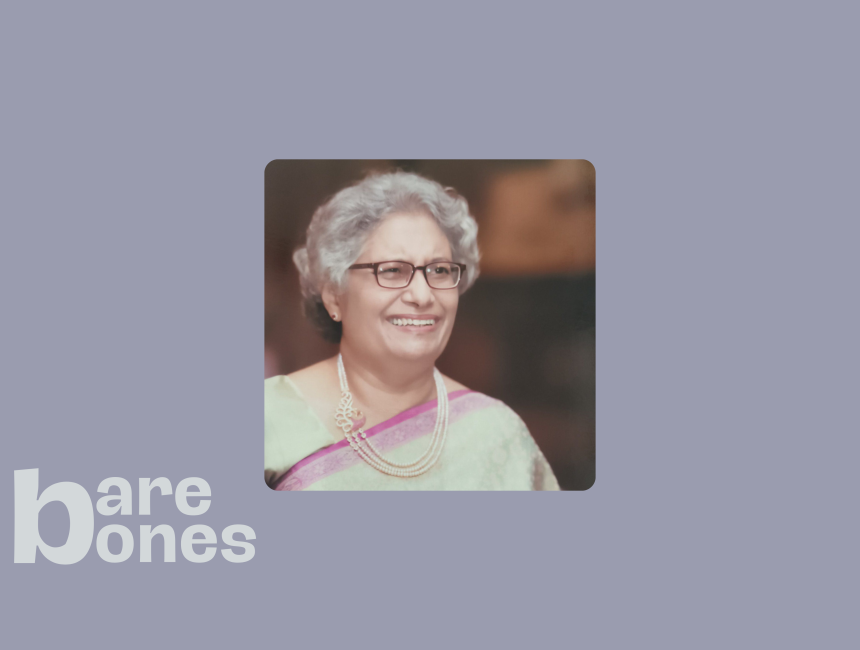Veena Naravane is an alumnus of Jawaharlal Nehru University, New Delhi. With nearly three decades of experience as a teacher and teacher trainer, she brings deep insight and commitment to the field of education.
A prolific writer, Veena has contributed extensively to leading magazines and newspapers. Her favourite literary form is the short story, a genre in which she has authored several notable works.
From 2020 to 2022, she served as President of the Army Wives Welfare Association. Over her husband’s distinguished forty-year career in the Indian Army, Veena witnessed firsthand the resilience and hardship endured by the families of fallen soldiers—experiences that deeply inform her writing and advocacy.
Currently, she is a consultant with the Tony Blair Institute for Global Change and serves on the advisory board of CEQUE, an NGO dedicated to empowering educators in rural and semi-urban communities through robust training programmes. At present she lives in Gurgaon, Haryana.
She talks to us about THE MEMORY TREE, a series of three books—collections of short stories crafted to help children who have lost a parent in service to the nation.
Please tell us about the series.
The books contain illustrated stories for children in the age-group of five to 13. They have been created especially for those children who have lost a parent in uniform, killed perhaps in enemy action. The books are meant to be a resource that will help these children to understand their loss and process their grief while also providing gentle solace. The books come with a few guidelines for adult caregivers on how to put the books to best use. They also have suggested activities that children can undertake to help them express what they are going through.
These books are the first of their kind. In India, hardly any children’s literature exists that deals specifically with the sensitive subject of death and the grief that ensues an untimely loss. These are gentle and tenderly written stories that will help children to make sense of the world of loss.
Why did you write these books?
Military deaths are different to other deaths at may levels. They devastate the survivors in ways the general citizenry may find it difficult to fathom. (Read ‘Understanding military deaths’ by the author, published in India Today, 18 December 2024.) Patriotic fervour runs high in the wake of such deaths and aid comes pouring in. While the grieving adult survivors get drawn into the sheer business of living, the children may largely get left alone to deal with their loss that they often times do not fully understand. These books have been written to fill this gap to a small degree.
What experiences or expertise do you bring to this subject?
I have been a witness to many military deaths and seen from close quarters the grief journey of the families affected by this loss. I have been called upon to provide succour to many such families. This has made me study and think deeply of their emotional needs.
What lasting value or impact do you envision these books to have on readers?
Every child deserves to grow up in an emotionally and psychologically supportive environment especially if he or she has faced a trauma. How else will the child grow up to be a healthy and stable adult? This series matters because it is a small step towards helping a military child overcome the trauma of losing a parent, process his/her grief, and mourn his/her parent in a wholesome manner.
Can you think of comparable books in this genre/category?
A similar book by an Indian author that comes to my mind is GONE GRANDMOTHER by Chatura Rao. This book is about a little girl trying to figure out where her deceased grandmother has disappeared. It is similar to my books because it tries to decode death or the physical absence of a loved one for the child. However, the similarity ends there. My books will aim at decoding the complex emotions felt by children after the loss of the uniformed parent.
Is there a question you would have liked us to ask you, but we didn’t?
Yes: Will these stories have a universal appeal?
While these stories are written for children who have lost a military parent, their emotional content extends far beyond that specific experience. The military backdrop gives the context, but the courage and resilience they model are universal. Each story transforms loss into remembrance. It shows that love continues through memories, small rituals, and acts of courage. The focus on the surviving parent, grandparents, and siblings highlights the importance of family bonds in dealing with grief. The imagery and situations described in the stories transform grief into a journey and not an endpoint. The stories also subtly represent Indian families and intergenerational values while keeping emotions universally human.


Leave a Reply